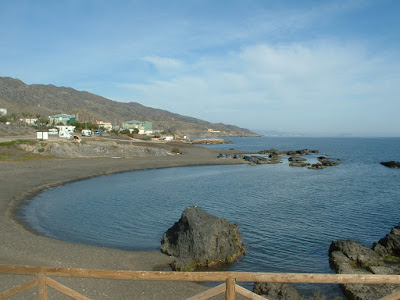The last of 2019 was a return visit to Villaricos, on the morning of November 26th. To take a closer look at those nice little bays mentioned in my previous blog post. The Spanish met office, which I usually rely on, gave marginal conditions for a quiet paddle, but two others were more optimistic. So it was a bit of gamble if I could get afloat there, or go seeking somewhere more sheltered. Wind and water conditions weren't perfect when I got there, but I was able to get afloat comfortably in the shelter of a bay, and once clear of exposed outcrops of rock paddling was easy enough in deeper water. I had to give exposed rocks a wide berth as the choppy conditions made it difficult to see what else might be lurking just below the surface. However, an hour later, after a bit of rock-dodging and a longer paddle along the coast, the wind freshened and I opted to get ashore while it was still easy to do so. This bit of shoreline is named the 'Playa La Dolores' and is worthy of another visit, in better conditions ...... and I'll stick to using the Spanish met office forecasts in future!
Time on the water was just a bit over an hour, and distance paddled was 3.2 kilometres.
There seems to be a bit of confusion over the name of this beach (playa). A road signpost reads 'Playa La Dolores' but a noticeboard on the beach reads 'CALA LA DOLORES'. A cala being a cove or inlet - and that term is used for the names of most stretches on this bit of coast. However, most maps refer to 'Playa La Dolores', so I am going to stick with that for this blog.
The first of 2020 was another visit to the Playa La Dolores' on the morning of January 15th. - in much better conditions. AS I drove down to the beach at 10:00 am I could see that the sea was glassy-calm and the low sun was starting to break through a hazy sky. I was on the water by 10:30 and heading south towards Villaricos to take a look at Cala de la Esperanzo.
 |
| Playa La Dolores ...... looking good. |
A headland at Cala de la Esperanzo. With an interesting variety of inclined layers of rock - and the look of a resting elephant. The water was so clear and calm that any rocks rising to just below the surface were visible and could be avoided.
Looking back along Cala de la Esperanzo. Taken, later in the morning, from a little car park and viewing point on a headland.
Next up, was a return for a closer look at rocks in the vicinity of Playa La Dolores. Despite the very calm sea and the clear water, I did gently scrape over submerged rocks a couple of times. Later I checked the underside of The Twist - no evidence at all of contact with rocks was found. Not a scratch, scuff or scrape. Which is reassuring for me and testimony to the toughness of the material (Hypalon) which Gumotex choose to use for their inflatable craft.
 Stopped to weigh up whether to go and dodge among this group of rocks with shallow water between them. With such calm, clear water there seemed little risk - and only once did I scrape over an unnoticed obstacle.
Stopped to weigh up whether to go and dodge among this group of rocks with shallow water between them. With such calm, clear water there seemed little risk - and only once did I scrape over an unnoticed obstacle.Jagged, or what! Wouldn't like to be anywhere near this one in a rough sea!
There was quite a variety of sea-birds around and on the rocks. Mostly wary of an old guy in a red kayak - but this group allowed me to drift quite close, before taking off with squawks, screeches and a flurry of wings. Later I was able to follow a cormorant on the water, as it repeatedly dived in search of a meal. Unless cormorants can devour their catch underwater I didn't witness the bird having any success.
Looking along Playa La Dolores. Taken, later in the morning, from that little car park on a headland. The green buildings in the distance are part of a chemical works. Beyond them is Cala de la Cueva and Cala de la Invencible. The beach of Playa La Dolores is all shingle and small stones - in varying shades of dark grey, stopping at the water's edge. Then shallow water with a rock bottom stretches quite a way out to sea.
From Playa La Dolores I set out on a longer paddle - past the chemical works, past Cala de la Cuevas and nearly to the end of Cala de la Invencible, where ruins remain on the hillside of buildings associated with the long gone mining operations which once dominated this bit of the coast.
Looking back along the the beach at Cala de la Invencible. This beach, with pale coloured sand and shingle, is much fresher and cleaner looking than Playa La Dolores. Those are more of the chemical work's buildings on the skyline - the low drone of pumps and other machinery coming from there is a bit intrusive.
It was a lengthy paddle back to where I had started from. At times light breezes ruffled the surface of the water. It had been a very pleasant first bit of quiet paddling to start the new year. Time on the water was two hours and the total distance (according to my GPS thingy) was about 8 kilometres.







